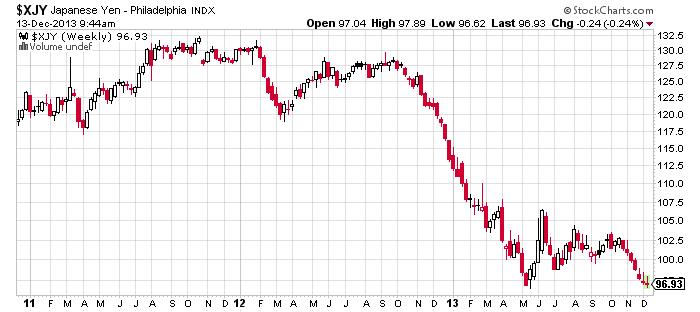If Money Printing Failed in Japan, Why Would It Work in the U.S.?
Economics / Quantitative Easing Dec 18, 2013 - 10:06 AM GMT
 What the Federal Reserve is doing in the U.S.—its effort to get the economy going via its money printing program—has already been tried by the second-largest economy in the world: Japan.
What the Federal Reserve is doing in the U.S.—its effort to get the economy going via its money printing program—has already been tried by the second-largest economy in the world: Japan.
Unfortunately, the easy monetary policy implemented by the Bank of Japan didn’t spur the Japanese economy. So why would it work for the U.S. economy?
One of the core purposes of easy monetary policy by the Federal Reserve was to improve lending so businesses would borrow money and grow (hopefully creating jobs) and consumers would borrow and spend (creating economic activity). All of this would lead to improved consumer confidence.
The Bank of Japan started a scheme to increase lending in Japan in 2010. It gave funds to its biggest banks to lend to companies. It set aside 21.5 trillion yen for this scheme; but sadly, only 8 trillion yen has been used. (Source: Reuters, October 17, 2013.) Easy money policies, and a program specially designed to give money to banks to lend out to companies, did not work in the Japanese economy.
And consumer confidence in the Japanese economy remains bleak. The index that tracks consumer confidence in the country stood at 41.9 in November. At the beginning of the year, it hovered near 45.0. A subset of consumer confidence, an index tracking consumers’ willingness to buy durable goods, stood at the lowest level of the year in November at 42.4 compared to 44.9 in January. (Source: Japan’s Cabinet Office, December 10, 2013.) The bottom line: after years of easy money policies and with a national debt-to-GDP multiple of 205%, there’s been no improvement in consumer confidence or consumer spending in the Japanese economy.
By no surprise, growth in the Japanese economy is now becoming questionable. An indicator that can suggest where an economy might be heading, capital spending, is declining in the Japanese economy again.
According to the Japanese Cabinet Office, the value of machine orders received by 280 manufacturers operating in the Japanese economy plunged by 4.6% in October from the previous month. This was the first decline since July. (Source: Japan’s Cabinet Office, December 10, 2013.)
What has happened and what is happening in the Japanese economy is a major concern to me. While the easy monetary policy wasn’t able to bring growth to that country, it did other things; it devalued the Japanese currency and created a stock market bubble.
The Japanese currency has reached a multiyear low due to too much yen (freshly printed new money) in the system. To see how bad the yen has deteriorated in value, look at the chart below of the Japanese Yen index. It compares the Japanese currency to a basket of other major world currencies.

Chart courtesy of www.StockCharts.com
Looking at all this, I can’t help but come to the conclusion that we are on the same path the Japanese economy took. Our stock market has taken the shape of a bubble, and the U.S. dollar continues to buck the trend downward. We all know what happens next.
This article If Money Printing Failed in Japan, Why Would It Work in the U.S.? is originally publish at Profitconfidential
Michael Lombardi, MBA for Profit Confidential
http://www.profitconfidential.com
We publish Profit Confidential daily for our Lombardi Financial customers because we belieainsl
ve many of those reporting today’s financial news simply don’t know what they are telling you! Reporters are trained to tell you the news—not what it can mean for you! What you read in the popular news services, be it the daily newspapers, on the internet or TV, is the news from a “reporter’s opinion.” And there’s the big difference.
With Profit Confidential you are receiving the news with the opinions, commentaries and interpretations of seasoned financial analysts and economists. We analyze the actions of the stock market, precious metals, interest rates, real estate and other investments so we can tell you what we believe today’s financial news will mean for you tomorrow!
© 2013 Copyright Profit Confidential - All Rights Reserved
Disclaimer: The above is a matter of opinion provided for general information purposes only and is not intended as investment advice. Information and analysis above are derived from sources and utilising methods believed to be reliable, but we cannot accept responsibility for any losses you may incur as a result of this analysis. Individuals should consult with their personal financial advisors.
© 2005-2022 http://www.MarketOracle.co.uk - The Market Oracle is a FREE Daily Financial Markets Analysis & Forecasting online publication.


